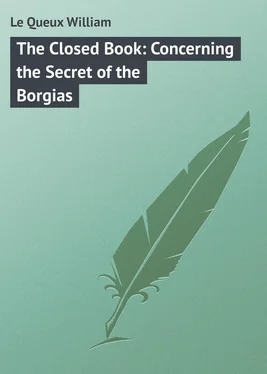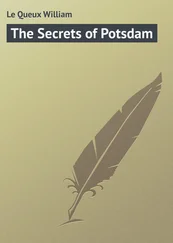William Le Queux - The Closed Book - Concerning the Secret of the Borgias
Здесь есть возможность читать онлайн «William Le Queux - The Closed Book - Concerning the Secret of the Borgias» — ознакомительный отрывок электронной книги совершенно бесплатно, а после прочтения отрывка купить полную версию. В некоторых случаях можно слушать аудио, скачать через торрент в формате fb2 и присутствует краткое содержание. Жанр: foreign_prose, на английском языке. Описание произведения, (предисловие) а так же отзывы посетителей доступны на портале библиотеки ЛибКат.
- Название:The Closed Book: Concerning the Secret of the Borgias
- Автор:
- Жанр:
- Год:неизвестен
- ISBN:нет данных
- Рейтинг книги:4 / 5. Голосов: 1
-
Избранное:Добавить в избранное
- Отзывы:
-
Ваша оценка:
- 80
- 1
- 2
- 3
- 4
- 5
The Closed Book: Concerning the Secret of the Borgias: краткое содержание, описание и аннотация
Предлагаем к чтению аннотацию, описание, краткое содержание или предисловие (зависит от того, что написал сам автор книги «The Closed Book: Concerning the Secret of the Borgias»). Если вы не нашли необходимую информацию о книге — напишите в комментариях, мы постараемся отыскать её.
The Closed Book: Concerning the Secret of the Borgias — читать онлайн ознакомительный отрывок
Ниже представлен текст книги, разбитый по страницам. Система сохранения места последней прочитанной страницы, позволяет с удобством читать онлайн бесплатно книгу «The Closed Book: Concerning the Secret of the Borgias», без необходимости каждый раз заново искать на чём Вы остановились. Поставьте закладку, и сможете в любой момент перейти на страницу, на которой закончили чтение.
Интервал:
Закладка:
Le Queux William
The Closed Book: Concerning the Secret of the Borgias
Chapter One
Which Mainly Concerns a Hunchback
These strange facts would never have been placed on record, nor would this exciting chapter of an eventful life have been written, except for two reasons: first, because the discovery I made has been declared to be of considerable importance to scientists, bibliophiles, and the world at large; and, secondly, because it is my dear wife’s wish that in order to clear her in the eyes of both friends and foes nothing should be concealed, misrepresented, or withheld.
It was, indeed, a memorable day when I halted before the white, almost windowless house of the prior of San Sisto and knocked twice at its plain, green-painted door. The sun-blanched, time-mellowed city of Florence lay silent, glaring, and deserted in the blazing noon of a July day. The Florentines had fled to the mountains for air. The persiennes, or sun-shutters, were everywhere closed, the shops shut, the people slumbering, and the silence only broken by the heat-song of the chirping cicale in the scorched trees at the end of the Lung Arno.
Like many another Tuscan town, it stood with long rows of high, frescoed, and sculptured palaces facing the brown river, its magnificent Duomo and campanile, its quaint fourteenth-century streets, and its medieval Ponte Vecchio all forming a grim, imposing relic of long-past glory. In many places its aspect was little changed since the old quattrocento days, when it was the centre of all the arts and the powerful rival of Venice and Genoa, although its trade has decayed and its power departed. The Lion and Lily of Florence upon a flag is no longer feared, as it once was, even by the bloodthirsty corsairs, and the rich Florentine brocades, velvets, and finely tempered arms are no longer in requisition in the markets of the world.
Save for the influx of scrambling tourists, it is one of the dead towns of Europe. Modern trade passes it by unnoticed; its very name would be forgotten were it not for those marvellous works of art in its galleries and in its very streets.
I had always loved the quaint old city, ever since a boy, when my father, a retired English naval officer, lived in that ancient house with the brown frescoes in the via di Pinti in the days before the shrieking steam trams ran to Prato or the splendid Palazzo Riccardi had been desecrated by the Government. At fourteen I left those quaint, quiet streets, with their cool loggias and silent, moss-grown courtyards, for the whirl of Paris, and subsequently lived and worked in London. Then, after an absence of nearly twenty years, I found myself living again in my beloved Tuscany by the Mediterranean, at Leghorn, forty miles distant from the medieval city of my childhood. Was it, therefore, surprising that the mood often seized me to go and revisit the old places I had known as a boy? I found them all unchanged – indeed, nothing changes in “Firenza la Bella” save the fortunes of her ruined nobility and the increase of garish hotels for the accommodation of the foreigner.
I was something of an antiquary, and through many years had been collecting medieval manuscripts on vellum, ancient chapters, diplomas, notarial deeds, and such-like documents, none being of later date than the fifteenth century. To decipher the work of the old scribes is, I admit, a dry-as-dust occupation; nevertheless, it is a work that grows on one, and the palaeographist is an enthusiast always. In one’s hobbies one should always join advantage to amusement, and seek to gather profit with pleasure.
My collection of musty-smelling parchments and rolls of folded vellum documents, with their formidable seals of wax or lead; of heavy vellum books bound in oaken boards and brass bosses, or tiny illuminated books of hours, so minutely written that a microscope was almost necessary to read them, appeal to very few people. Most of my friends regarded them as so many old and undecipherable books and rolls, without interest and without value. They wondered that, being continually occupied at my desk writing novels, I should take up such an essentially dry study.
Yet it was this love of collecting that first brought me into contact with Francesco Graniani, a queer little old hunchback, who was a kind of itinerant dealer in antiques. Unshaven, very shabby, and not particularly clean, he dressed always in the same faded drab suit, and, summer or winter, wore the same battered, sun-browned straw hat through all the years I knew him.
Often this strange, rather tragic figure would meet me in the sun-baked streets of Leghorn, raise his battered hat respectfully, and, taking me aside, produce mysteriously from his pocket a parchment charter with its seal, some leaves from a medieval psalter, or perhaps an illuminated codex, or a book of hours with painted miniatures. Where le obtained such gems I have never to this day discovered. None knew who the old fellow was, or where he lived; he was a complete mystery.
One morning while crossing the great square I encountered him, and he informed me in his strange, mysterious manner of the existence of a very rare and interesting manuscript in the possession of the prior of the ancient church of San Sisto, at Florence.
“If the signore goes to Firenze, Father Landini will no doubt allow him to have sight of the parchment book,” he said. “Tell him that Francesco Graniani wishes it.”
“But what is the character of the manuscript?”
I inquired.
“I know nothing of it,” he replied evasively, “except that I believe it once belonged to the Monastery of the Certosa. I heard of it only last night, and thought perhaps it might interest you.”
It certainly did. Any discovery of that kind always attracted me – ever on the lookout as I was for a single folio of the original Dante.
With the object of inspecting the palaeographic treasure I next day took train to Florence, and an hour after my arrival knocked in some trepidation at the prior’s green door.
The long grey church, one of the oldest in that ancient city, stood in its little piazza off the via San Gallao, and adjoining it the prior’s house, a long, low, fourteenth-century building, with high, cross-barred windows, and a wonderful old-world garden in the rear.
In answer to my summons there appeared a thin, yellow-faced, sharp-tongued house-woman, and on inquiry for the father I was at once invited into a big stone hall, cool and dim after the sun-glare outside.
“Body of a thousand anchovies! Teresa, who has come to worry me now?” I heard a man demand angrily from a door at the end of a darkened corridor. “Didn’t I tell you that I was not at home until after mass tomorrow? Plague you, Teresa?”
To the wizen-faced woman I stammered some apology, but at the same moment I saw a huge, almost gigantic figure in a long black cassock and biretta emerge from the room.
“Oh, signore?” he cried apologetically, the instant he caught sight of me. “Do pray excuse me. I have so many of my poor people here begging that I’m compelled to be out to them sometimes. Come in! Come in?” Then he added reproachfully, turning to his housekeeper, “Teresa, what manners you have to leave this gentleman standing in the hall like a mendicant! I’m ashamed of you, Teresa! What must the signore think – and a foreigner, too!”
In an instant the Very Reverand Bernardo Landini and I were friends. I saw that he was thoroughly genuine, a strange admixture of good-fellowship and piety. His proportions were Gargantuan. His clean-shaven face was perfectly round, fresh, and almost boyish in complexion, his dark eyes twinkled with merriment, his stomach was huge and spoke mutely of a healthy appetite, his hand big and hearty in its shake, and in his speech he aspirated his “e’s,” which showed him to be a born Florentine.
Читать дальшеИнтервал:
Закладка:
Похожие книги на «The Closed Book: Concerning the Secret of the Borgias»
Представляем Вашему вниманию похожие книги на «The Closed Book: Concerning the Secret of the Borgias» списком для выбора. Мы отобрали схожую по названию и смыслу литературу в надежде предоставить читателям больше вариантов отыскать новые, интересные, ещё непрочитанные произведения.
Обсуждение, отзывы о книге «The Closed Book: Concerning the Secret of the Borgias» и просто собственные мнения читателей. Оставьте ваши комментарии, напишите, что Вы думаете о произведении, его смысле или главных героях. Укажите что конкретно понравилось, а что нет, и почему Вы так считаете.












